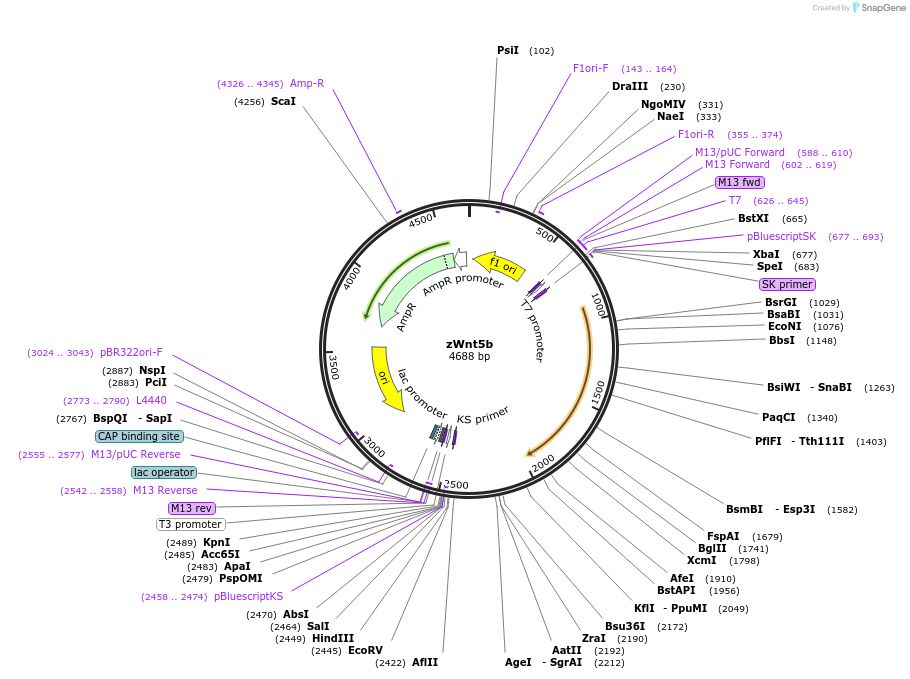zWnt5b
(Plasmid
#21282)
-
Depositing Lab
-
Sequence Information
Ordering
| Item | Catalog # | Description | Quantity | Price (USD) | |
|---|---|---|---|---|---|
| Plasmid | 21282 | Standard format: Plasmid sent in bacteria as agar stab | 1 | $89 | |
Backbone
-
Vector backbonepBluescript
-
Backbone manufacturerStratagene
- Backbone size w/o insert (bp) 3000
Growth in Bacteria
-
Bacterial Resistance(s)Ampicillin, 100 μg/mL
-
Growth Temperature37°C
-
Growth Strain(s)DH5alpha
-
Copy numberHigh Copy
Gene/Insert
-
Gene/Insert nameWnt5b
-
SpeciesD. rerio (zebrafish)
-
Insert Size (bp)1091
-
Entrez Genewnt5b (a.k.a. CHUNP6928, id:ibd5111, pipetail, ppt, wnt-5, wnt5, wnt[b], wu:fk85g06)
Cloning Information
- Cloning method Restriction Enzyme
- 5′ cloning site EcoRI (not destroyed)
- 3′ cloning site EcoRI (not destroyed)
- 5′ sequencing primer T7
- 3′ sequencing primer T3
- (Common Sequencing Primers)
Resource Information
-
A portion of this plasmid was derived from a plasmid made byFrom Phil Inghams' lab, cloned by P. Blader.
-
Article Citing this Plasmid
Terms and Licenses
-
Academic/Nonprofit Terms
-
Industry Terms
- Not Available to Industry
Trademarks:
- Zeocin® is an InvivoGen trademark.
Depositor Comments
Zebrafish wnt5 (pipetail) cDNA for antisense probe. Full-length ORF plus some (exact sequence not known, likely genbank NM_130937) 5' and 3' UTRs, 1.75kb total insert. Cloned into EcoRI site of pBluescript (there is also an internal EcoRI!). From Phil Inghams' lab, cloned by P. Blader.
Used to be called wnt5 and consider by many people to be wnt5a. however, after Gilbert cloned the real wnt5a, it is now known as wnt5b.
For antisense zWnt5b: cut w/ XbaI, transcribe w/ T3.
These plasmids were created by your colleagues. Please acknowledge the Principal Investigator, cite the article in which the plasmids were described, and include Addgene in the Materials and Methods of your future publications.
-
For your Materials & Methods section:
zWnt5b was a gift from Randall Moon (Addgene plasmid # 21282 ; http://n2t.net/addgene:21282 ; RRID:Addgene_21282) -
For your References section:
Distinct Wnt signaling pathways have opposing roles in appendage regeneration. Stoick-Cooper CL, Weidinger G, Riehle KJ, Hubbert C, Major MB, Fausto N, Moon RT. Development. 2007 Feb . 134(3):479-89. 10.1242/dev.001123 PubMed 17185322



